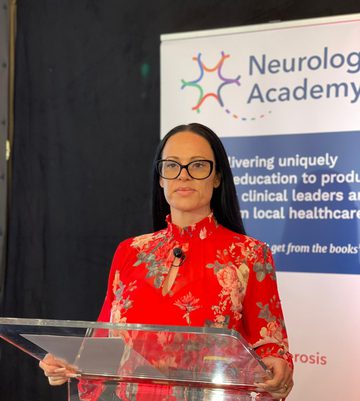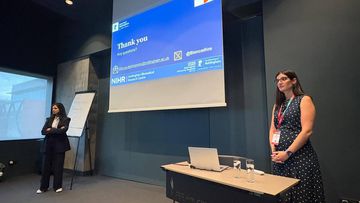Changing practice to change lives: the power of education to improve quality of care
NewsThis week is MS Awareness Week. Often we think of awareness-raising as something needed in the general public, but what about amongst healthcare professionals who support people with MS themselves?
There can be a significant difference in the experiences of people with MS and the care they receive, often dependent on the professionals supporting them. Someone who is supported by a healthcare professional who understands how they truly experience life with their MS, and who works in partnership with them to live their best lives is likely to feel that the quality of their care is high, regardless of the service structure around them.
It is this premise which drives Neurology Academy's Managing Director Sarah Gillett - that through educating professionals, people's lives are changed.

When a consultant understands what that message will mean to someone, they can deliver it with compassion. 'There's so much evidence showing that your diagnosis affects your interactions with the rest of your healthcare team after that. It affects your trust in the professionals around you,' Sarah explains.
Delegate from MS Foundation MasterClass on patient experience session
Professor Gavin Giovannoni remarked on a recent blog that 'When asked, a large number of pwMS tell me the worst part of MS is being told you have MS.' Indeed, recent evidence suggests that people with MS can develop post-traumatic stress disorder as a result of a poor diagnosis and Shift.MS and Barts are looking to research this in more detail.
Sarah talks about the impact of the session in the MS MasterClass where people with MS come and share their diagnosis experiences as a practical way of educating delegates about the importance of a good diagnosis - and the way it shapes that patient's journey.
'When I hear about healthcare professionals that are changing their practice because of our course, it makes every bit of effort so worthwhile. That's every single patient they see from then on receiving elevated care, having more meaningful interactions, useful referrals, a quality of care - of life.' With over 3,500 clinicians attending a MasterClass to date, and the average MS service supporting 1,757 people with MS, there is reason to hope that many lives have been impacted for the better.
Delegate of MS Foundation MasterClass
Delegate of MS Foundation MasterClass
Understanding the lived reality of MS makes healthcare professionals more approachable, and gives them a more open clinical practice - which leads to more holistic management and, hopefully, a removal of taboo subjects so that people with MS can get the support they need.
Whether specialist or generalist, trust between healthcare professionals and the people they support is key, and to feel trust a person needs to feel entirely 'seen' and understood. Being able to discuss financial fears or concerns over a career with an occupational therapist, to discuss family planning with a neuropharmacist or specialist nurse - these conversations rely on open trust, on human connection.
'Younger people might want to ask what their MS will mean for having children, for their career. Things like sexual relationships can still be very taboo, but this needs to be an open conversation for people with their consultant or specialist nurse. Sex can be really impacted, and for young people going into relationships, being able to talk about this with their healthcare professional can have a significant impact on their quality of life.'
Sarah explains the 'domino effect' from each course that she values so much. Every clinician who improves their practice as a result of education not only impacts the lives of their patients thereafter, but the practice of their junior doctors, their colleagues and their wider service.
Sarah also places a huge value on the Faculty and speakers for each Academy, and the incredible enthusiasm and integrity that they bring to the teaching. She shares how teachers on the courses often continue to learn, listening to patient's experiences or hearing from peers and developing a deeper understanding.
'Our speakers often come back on as delegates to deepen their own knowledge and to look at care from a different angle,' Sarah explains. 'We are all always learning, and as we revise our courses, they continue to offer something new, even to seasoned practitioners.'
“The MS MasterClasses are completely centred on the person with MS. In the course we hear directly from people with MS about their stories, and the other sessions are focussed on practical things that we can do to help problems that people with MS face. It is such a pleasure to see delegates come to the courses, and then go home and work with the faculty and the new friends they have made to make their services work better for their patients”
The MS MasterClasses have evolved for this year, moving further away from didactic lectures and focusing more than ever on practical, case-based discussion and interactive learning. Meanwhile, the thematic webinars, which began as a response to educational needs resulting from the coronavirus pandemic, have broadened the content and styles of the Academy's offering further, and spurred a whole host of virtual and on-demand courses, both standalone and modular.
Delegate from the MS Foundation MasterClass 2020
'We were flexible and responsive at the start of COVID - and that has made us even more inclusive now. If you're interested in educating yourself, we're here for you,' Sarah shared. Indeed, with the volume of on-demand material, travel and time restrictions are far less impinging, and international delegates are joining Neurology Academy's community.
The educational model Neurology Academy uses is completely transferable, and Sarah is keen to see it make a difference in the lives of people with other medical conditions, other needs. Within the next month, the Academy will launch a new care pathway for pediatric spinal muscular atrophy (SMA), and begin to raise awareness and understanding for the condition.
Related articles
Encouraging excellence, developing leaders, inspiring change
MS Academy was established in 2016 and in that time has accomplished a huge amount with exciting feedback demonstrating delegates feel inspired and energised along their personal and service development journeys. The various different levels of specialist MS training we offer are dedicated to case-based learning and practical application of cutting edge research.


